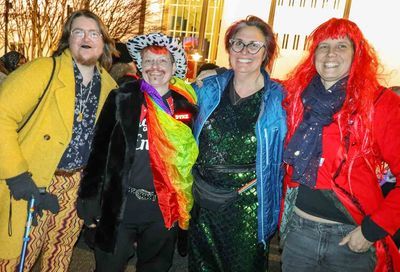Study: Transgender nondiscrimination laws do not jeopardize public safety in restrooms
Number and frequency of crimes in restrooms and locker rooms decreases in places with pro-transgender laws

A new study finds that Massachusetts’ public accommodations nondiscrimination laws that include gender identity have no affect on the number or frequency of criminal incidents in restrooms, locker rooms, or other intimate spaces.
Researchers from the Williams Institute, an LGBTQ-focused think tank at the UCLA School of Law, used criminal report data from several Massachusetts localities to compare differences in the rates of restroom-related crime in areas with and without transgender-inclusive public accommodation laws. (Given the fairly recent passage of a statewide nondiscrimination law regarding transgender access to public accommodations, the study focused on crime rates in places that had and those that lacked local pro-LGBTQ ordinances prior to 2016.)
According to the study, which was published in Sexuality Research and Social Policy, privacy and safety violations in restrooms, locker rooms, or changing rooms are exceedingly rare. But in places where transgender-inclusive public accommodation laws were passed, there were fewer incidents of assault, sex crimes, voyeurism, or other privacy violations than in comparable areas without the laws.
“Opponents of public accommodations laws that include gender identity protections often claim that the laws leave women and children vulnerable to attack in public restrooms,” Amira Hasenbush, the study’s lead author and a law and policy fellow at the Williams Institute, said in a statement. “But this study provides evidence that these incidents are rare and unrelated to the laws.”
The study drops just two months before Massachusetts voters decide whether to uphold the state’s 2016 nondiscrimination law that allows transgender people to access public accommodations. In the run-up to the referendum, social conservatives and anti-LGBTQ opponents have alleged that people, particularly women and children, are placed at higher risk of assault or abuse when transgender people are allowed to use facilities matching their gender identity.
The outcome of that vote will be closely watched, because if the law is repealed, it means social conservatives will likely use similar arguments to repeal nondiscrimination laws or pass anti-transgender laws elsewhere.
“Research has shown that transgender people are frequently denied access, verbally harassed or physically assaulted while trying to use public restrooms,” study author Jody L. Herman, a scholar of public policy at the Williams Institute, said in a statement. “This study should provide some assurance that these types of public accommodations laws provide necessary protections for transgender people and maintain safety and privacy for everyone.”
Support Metro Weekly’s Journalism
These are challenging times for news organizations. And yet it’s crucial we stay active and provide vital resources and information to both our local readers and the world. So won’t you please take a moment and consider supporting Metro Weekly with a membership? For as little as $5 a month, you can help ensure Metro Weekly magazine and MetroWeekly.com remain free, viable resources as we provide the best, most diverse, culturally-resonant LGBTQ coverage in both the D.C. region and around the world. Memberships come with exclusive perks and discounts, your own personal digital delivery of each week’s magazine (and an archive), access to our Member's Lounge when it launches this fall, and exclusive members-only items like Metro Weekly Membership Mugs and Tote Bags! Check out all our membership levels here and please join us today!
























You must be logged in to post a comment.